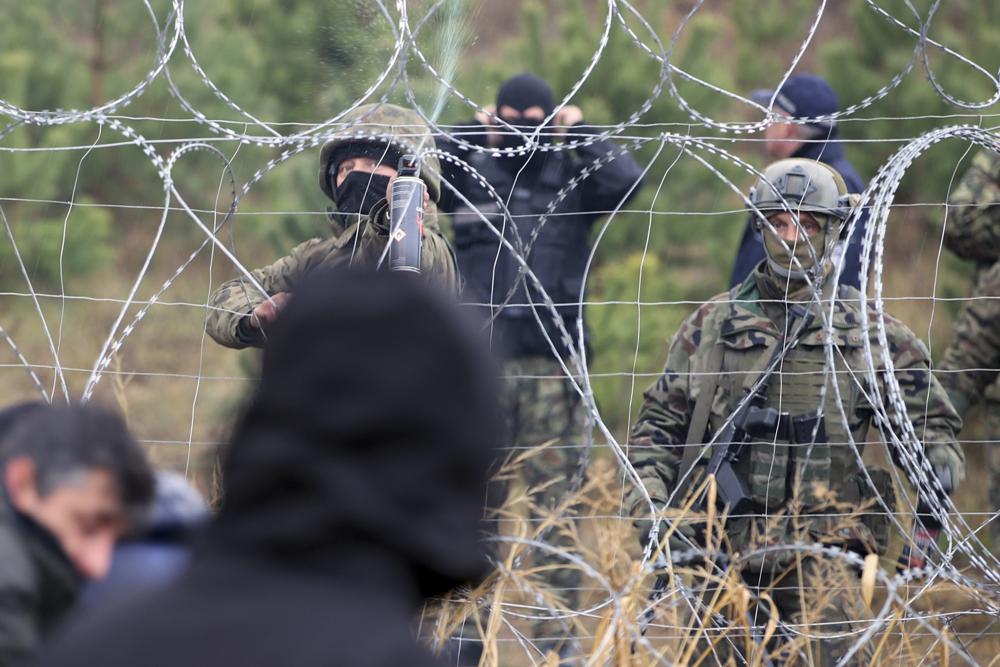ROME – The Vatican’s announcement Monday that Pope Francis will visit Florence in February for a meeting with Mediterranean bishops and civil leaders is just the latest public and international event on his schedule that highlights his concern for migrants.
While the plight of migrants and refugees is something the pope speaks of often, apart from his Christmas liturgies he has only a handful of confirmed major commitments over the next few months, most of which are dedicated to the migrant issue in some way.
In the first week of December Pope Francis is scheduled to visit Greece and Cyprus, where his agenda is filled with ecumenical appointments and meetings with migrants, including a return visit to the Greek island of Lesbos to visit migrant camps.
During his Feb. 27 visit to Florence, the pope will meet with bishops and mayors from several Mediterranean countries, and discussion will undoubtedly touch on the plight of migrants and refugees coming into Europe.
After hearing speeches from several bishops and civil leaders and after giving a speech himself, Francis will hold a meeting with a group of 50 migrants who are currently being hosted by Italy. He will then celebrate Mass, pray the traditional Angelus devotion, and head back to Rome.
In a statement made after the announcement of the pope’s visit to Florence, Italian Cardinal Gualtiero Bassetti of Perugia, president of the Italian Bishops’ Conference, saying the pope’s presence “not only blesses the initiative, but places his seal on it.”
“The challenges we are called to face are a stimulus to overcome the barriers that mark the Mediterranean and to intensify the encounter and communion between the sister churches,” he said, adding, “only by weaving fraternal relationships is it possible to promote the process of integration.”
“Let’s start again, then, from Florence to ensure that the shores of the Mediterranean once again become a symbol of unity and not a border,” Bassetti said.
The Florence meeting comes exactly two years after a similar meeting in Bari in February 2020, where the pope met with 50 bishops and patriarchs from different Catholic churches throughout the Mediterranean to discuss the dire situation of Christians in Middle Eastern Christians and how to ensure their survival, as well as migration.
He previously visited Bari in July 2018 for a similar ecumenical meeting and prayer with the heads of Middle Eastern Churches, which also touched on the issue of migration.
Pope Francis’s visit to Florence will also fall just two months after his trip to Greece and Cyprus, which will largely focus on issues of migration and ecumenical relations with the Orthodox.
While in Cyprus, in addition to his various meetings with civil and ecclesial authorities, including meetings with several Orthodox bishops and patriarchs, the pope will hold an ecumenical prayer service with migrants.
Similarly, during his visit to Greece, Pope Francis will spend half a day visiting the island of Lesbos, one of the country’s primary points of arrival for incoming migrants, where he will meet with the refugees at the government-run Reception and Identification Center in Mytilene, the capital of Lesbos.
In a hugely symbolic gesture, Pope Francis on his return flight from Lesbos in 2016 brought back a dozen Syrian Muslims with him on the papal plane, who were assisted by the Vatican in their process of integration in Italy.
These visits from the pope come amid a fresh migrant crisis unfolding at the Poland-Belarus border.
Since Nov. 8, hundreds of migrants mostly from the Middle East have been stuck at Belarus’s crossing with Poland, hoping to reach western Europe, with Belarus allegedly encouraging them to cross and Poland prohibiting their entry.
The situation has had political fallout, with some western countries accusing Lukashenko of using the migrants as pawns to destabilize the European Union in retaliation for sanctions on his authoritarian regime.
Poland, on the other hand, has refused to allow the migrants entry, and things escalated Tuesday when Polish forces used water cannons and tear gas on migrants, who had begun throwing stones and branches at security forces in an attempt to breach the wire fence at the border.
After the violent scuffle, which marked the worst in a standoff on the European Union’s frontier, several of the migrants were then moved to a nearby warehouse, but fear they will soon be deported.
So far at least nine people have died at the border in recent weeks, many from hypothermia, yet many refuse to leave and remain camped out at the border as the political standoff between Poland and Belarus continues.
There are few things the pope has beat his drum about quite as much as the migration crisis during his eight years in office, and if recent crises and his schedule over the next few months are any indication, it’s an issue that will continue to be a top priority moving into the new year.

